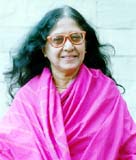The Rediff Interview/Kamala Das
'They are not willing to accept the fact that a Hindu woman can be unconventional'
 Do you believe in God?
Do you believe in God?
Of course, I do.
In what form?
I believe that God is there is a very cell of my body, your
body, every cell of this world. Some kind of power, that is how
I think of God. That God is good enough for me. I don't need Gods
trapped in mausoleums, temples, churches, mosques. I don't need
such Gods who can be imprisoned.
You are quite unconventional in your writings, lifestyle and
opinions. May be because of that, you created a lot of controversies
too. Do you enjoy being a controversial figure?
No, I don't enjoy it at all. I suffer from such controversies.
It don't know the mind of society so well so, sometimes I astonish
them by my frankness and they are not willing to accept the fact
that a Hindu woman could be unconventional and not-so-traditional.
Probably because I have some courage to be what I am, and I don't
see my faults as faults -- I see them as characteristics; strengths
too. Why not, if you realise that you are only a human being.
You have spent most of your life in Calcutta and Bombay. How
was it like moving from Bombay to Kerala after your husband's
retirement?
It was really a disappointment for me. But my husband insisted
on coming back. His argument was that we had to be cremated in
the southern compound, like any tradiitional Nair. He said, let's
go back to the place where we are going to be cremated ultimately.
But I didn't want cremation to take place so soon.
At first I tried to make friends with the so-called intellectuals of the
state. And I felt, well, I was accepted, I was one of them although
I was a divergent intellectual by nature.
But later on I began to realise that they did not have strong bonds of affection. They
were not capable of loving the way the common, ordinary person
can. Then I began to write a column in a very popular weekly,
Malayala Manorama,and the intellectuals came to me and said,
don't stoop so low, please don't write for such a magazine. Yet,
I went on writing.
And I realised that my world was growing. Because now whenever I step out
of the house, the shop man, the autorickshaw man, everyone would come forward
and say, 'Amma, do you want me to help you? Do you want tea?
May I bring a chair?' So, I feel I am picking up sons and daughters wherever
I go. It delights me. I never could have expected such a warm reception from
the intellectuals.
These people have accepted me and professed to love me.
That was my idea when I started to write, I wanted to be loved. That is my
prime motive. Now I am successful. I am love, I am called Amma,
my world is growing. When I went to Houston for a public reception,
the young people came up to the stage one by one and kissed me.
Well, they are all my sons and daughters. I felt very strong.
This is what I wanted to be. To be loved, that's come quite late
in my life. But it has come all the same.
Didn't you feel loved when you were young?
Not enough, really. That's why I leapt into several relationships
which were not very correct, probably hoping to be loved. Because
there was this capacity in me to love, to envelop something with
love, and there wasn't anyone strong enough to reciprocate adequately.
Now I feel this is the best phase of my life.
It is unbelievable,
it is like waking at four o'clock or so and suddenly finding the
sky getting brighter: a new dawn. Unexpectedly, in the afternoon!
I never expected this kind of glory. Emotional repose. I am very
lucky. For an Indian to be so lucky in her sixty fourth year,
I think, is incredible. I have no complaints.
You mentioned about relationships. You wrote so many beautiful
poems, great stories and articles, but people still talk about
that one book you wrote, My Story. Does it sadden you?
No. It brought lots of money, and it helped my husband. It
brought in a lot of money for my children. I don't have any qualms
of conscience.
 I have read that you wrote My Story when you were not well,
and you needed money for treatment and you didn't expect to get
well....
I have read that you wrote My Story when you were not well,
and you needed money for treatment and you didn't expect to get
well....
That is true. I wasn't well. But it was his idea that I give
it to a publisher who was at the hospital, bargaining for it.
I don't have any regrets. The only person who should have complained
was my husband, but iif he hadn't asked me, I wouldn't have done
that. That is the reason why my marriage stayed stable and became
a great success ultimately. I would do what he wanted me to do.
In that book you have written about several relationships that
you have had. Were they figments of your imagination, just a fantasy,
or real?
Not really (fantasy), Shobha. I was a very attractive young
woman. And I don't blame the men who fell for me. I enjoyed it.
That was the season for loving and I was young.
|





 Do you believe in God?
Do you believe in God?
 I have read that you wrote My Story when you were not well,
and you needed money for treatment and you didn't expect to get
well....
I have read that you wrote My Story when you were not well,
and you needed money for treatment and you didn't expect to get
well....